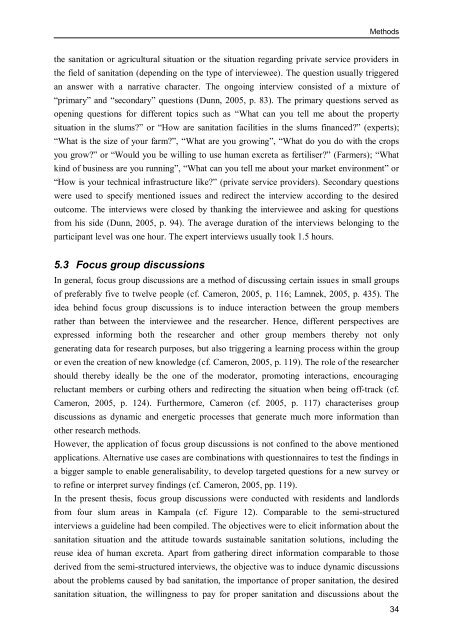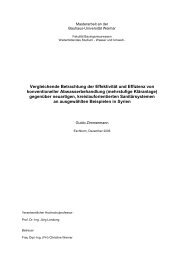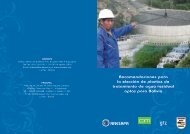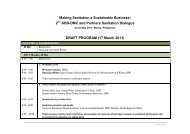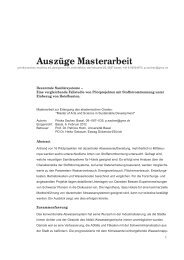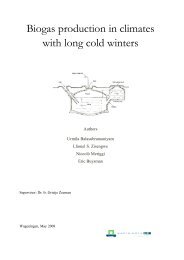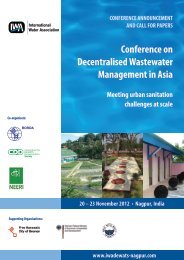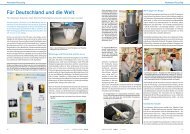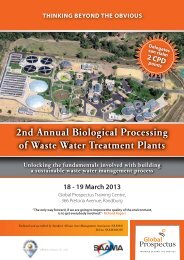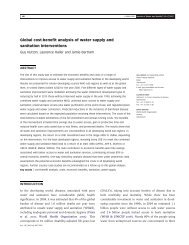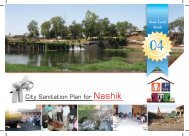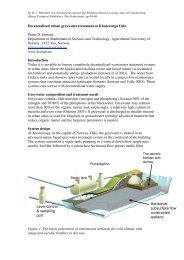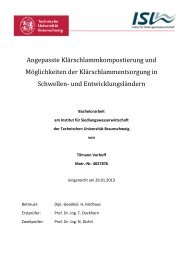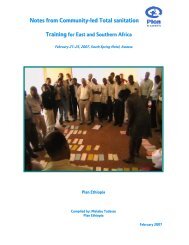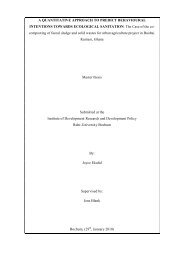Economic Effects of Sustainable Sanitation - SuSanA
Economic Effects of Sustainable Sanitation - SuSanA
Economic Effects of Sustainable Sanitation - SuSanA
You also want an ePaper? Increase the reach of your titles
YUMPU automatically turns print PDFs into web optimized ePapers that Google loves.
Methods<br />
the sanitation or agricultural situation or the situation regarding private service providers in<br />
the field <strong>of</strong> sanitation (depending on the type <strong>of</strong> interviewee). The question usually triggered<br />
an answer with a narrative character. The ongoing interview consisted <strong>of</strong> a mixture <strong>of</strong><br />
―primary‖ and ―secondary‖ questions (Dunn, 2005, p. 83). The primary questions served as<br />
opening questions for different topics such as ―What can you tell me about the property<br />
situation in the slums?‖ or ―How are sanitation facilities in the slums financed?‖ (experts);<br />
―What is the size <strong>of</strong> your farm?‖, ―What are you growing‖, ―What do you do with the crops<br />
you grow?‖ or ―Would you be willing to use human excreta as fertiliser?‖ (Farmers); ―What<br />
kind <strong>of</strong> business are you running‖, ―What can you tell me about your market environment‖ or<br />
―How is your technical infrastructure like?‖ (private service providers). Secondary questions<br />
were used to specify mentioned issues and redirect the interview according to the desired<br />
outcome. The interviews were closed by thanking the interviewee and asking for questions<br />
from his side (Dunn, 2005, p. 94). The average duration <strong>of</strong> the interviews belonging to the<br />
participant level was one hour. The expert interviews usually took 1.5 hours.<br />
5.3 Focus group discussions<br />
In general, focus group discussions are a method <strong>of</strong> discussing certain issues in small groups<br />
<strong>of</strong> preferably five to twelve people (cf. Cameron, 2005, p. 116; Lamnek, 2005, p. 435). The<br />
idea behind focus group discussions is to induce interaction between the group members<br />
rather than between the interviewee and the researcher. Hence, different perspectives are<br />
expressed informing both the researcher and other group members thereby not only<br />
generating data for research purposes, but also triggering a learning process within the group<br />
or even the creation <strong>of</strong> new knowledge (cf. Cameron, 2005, p. 119). The role <strong>of</strong> the researcher<br />
should thereby ideally be the one <strong>of</strong> the moderator, promoting interactions, encouraging<br />
reluctant members or curbing others and redirecting the situation when being <strong>of</strong>f-track (cf.<br />
Cameron, 2005, p. 124). Furthermore, Cameron (cf. 2005, p. 117) characterises group<br />
discussions as dynamic and energetic processes that generate much more information than<br />
other research methods.<br />
However, the application <strong>of</strong> focus group discussions is not confined to the above mentioned<br />
applications. Alternative use cases are combinations with questionnaires to test the findings in<br />
a bigger sample to enable generalisability, to develop targeted questions for a new survey or<br />
to refine or interpret survey findings (cf. Cameron, 2005, pp. 119).<br />
In the present thesis, focus group discussions were conducted with residents and landlords<br />
from four slum areas in Kampala (cf. Figure 12). Comparable to the semi-structured<br />
interviews a guideline had been compiled. The objectives were to elicit information about the<br />
sanitation situation and the attitude towards sustainable sanitation solutions, including the<br />
reuse idea <strong>of</strong> human excreta. Apart from gathering direct information comparable to those<br />
derived from the semi-structured interviews, the objective was to induce dynamic discussions<br />
about the problems caused by bad sanitation, the importance <strong>of</strong> proper sanitation, the desired<br />
sanitation situation, the willingness to pay for proper sanitation and discussions about the<br />
34


